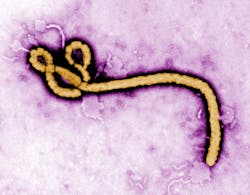CDC releases Ebola guidance for wastewater workers
The word “Ebola” has been frightening many people across the country, but chances are, most won’t come into contact with the virus. However, wastewater workers, especially those who work in and around hospitals, must take precautions to ensure their own safety.
The Centers for Disease Control and Prevention issued interim guidance for workers who handle untreated sewage from hospitals and other places that have had confirmed Ebola cases.
Recommendations for handling untreated sewage include:
- Goggles or face shield: to protect eyes from splashes of untreated sewage
- Face mask (e.g., surgical mask): to protect nose and mouth from splashes of human waste. If undertaking cleaning processes that generate aerosols, a NIOSH-approved N-95 respirator should be used.
- Impermeable or fluid-resistant coveralls: to keep untreated sewage off clothing
- Waterproof gloves (such as heavy-duty rubber outer gloves with nitrile inner gloves) to prevent exposure of hands to untreated sewage
- Rubber boots: to prevent exposure of feet to untreated sewage.
Visit the CDC’s website for the complete guidance.
